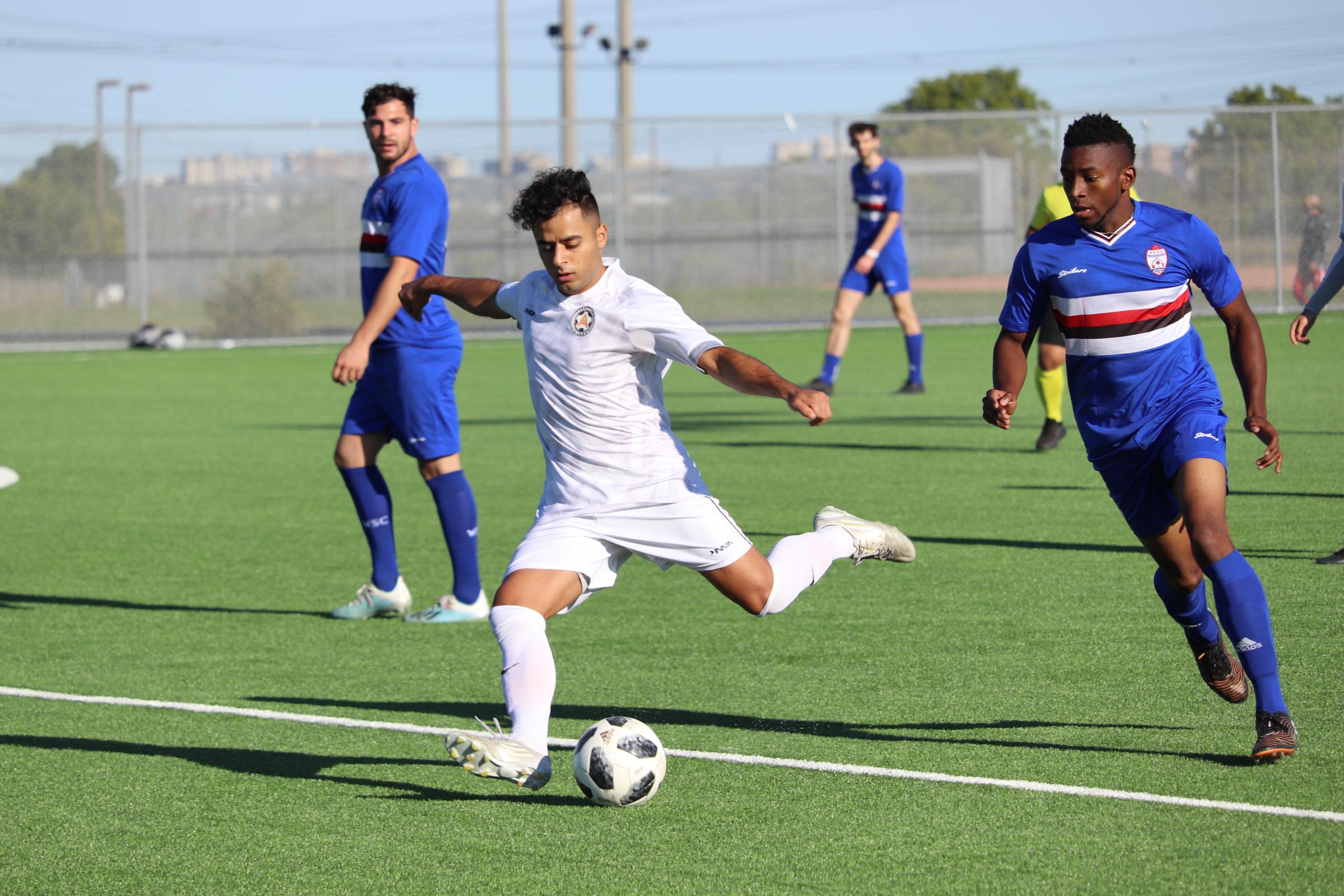By Ben Steiner
When the OUA cancelled all fall sports on June 8, many athletes were crushed, although they understood the reason. As the academic year neared its kickoff, the U Sports soccer season did not—but that hasn’t led to a lack of soccer activity for the Ryerson Rams.
The Rams men’s team is back at Downsview Park, their off-campus base, despite having no matches on the docket. A majority of the roster has been training at the facility three times a week, something many U Sports programs haven’t done.
“We’re blessed that we’ve got fantastic leadership at the university and the athletics department that they’ve been able to set all the different policies in place to allow us to train together,” said Rams head coach Filip Prostran to reporters on Sept. 29.
“We all want to stay healthy, we want to stay fit and sharp for if a season does come. We’re not sure when this will clear up, but when it does, we want to be ready to go”
The department has also set up a gym at the Downsview facility, allowing players to train there rather than making the trek back to their usual space at the Mattamy Athletic Centre.
While the team has been on the field, training has looked a lot different than it would if there were matches to prepare for. Prostran and his coaching staff have adapted their training styles, focusing on individual development rather than game plans. The fifth-year head coach explained that the time off has given him and the student-athletes the opportunity to focus on things that would usually be overlooked.
How COVID-19 impacts training
When players show up to training, they are required to wear a mask. Before they are allowed to train, a coach asks them whether they have felt any COVID-19 symptoms, and if they answer yes to any, they can’t train that day. Following the session, there is no joking around or hanging out: everyone has to get off the field, put on their mask and leave the area.
“Of course it’s tough and it’s different,” Prostran said. However, it is an adjustment that the team are willing to make to get back to some form of normalcy.
Veteran goalkeeper Ali Ghazanfari thought his days in blue and gold were over when he was celebrated at Seniors Day last year, but that may not be the case. The native of Stouffville, Ont. has entered the Ted Rogers Master of Business Administration (MBA) program. With the cancellation of the season, he has maintained his U Sports eligibility for an additional year.
Returning to the training pitch has been a welcome escape for Ghazanfari who found that the time off took a large toll on some of his skills.
“There’s a lot of things you lose staying inside, but for me, I noticed a lot of my technical abilities were a bit rusty,” he said. “I was slow to react, my touch didn’t feel as good; my passing, the technical aspect was missed not being able to train.”
Midfielder Faisal Ghaffur knows that the time off from soccer activities has been a struggle for many, but as student-athletes, they all have the personal motivation to keep themselves going.
“We all want to stay healthy, we want to stay fit and sharp for if a season does come. We’re not sure when this will clear up, but when it does, we want to be ready to go,” said the business management student during his Sept. 29 media availability.
Matches are back for some
Although U Sports soccer has not returned outside of school-based training, some Rams are still competing. Fourth-year striker Abdallah El-Chanti is suiting up for Alliance United of League 1 Ontario, a team coached by University of Toronto head coach, Ilya Orlov, and featuring several former Ryerson players.
League 1 Ontario is the top division of men’s soccer in Ontario, a common place for OUA players to play in the summer months away from the school athletic year.
Ghaffur, as well as defender Alex Meczarski, are also playing in League 1 exhibition.
League 1 Ontario has returned in three-team cohorts under the Ontario Soccer’s Return-to-Play plan. Three teams can play round-robin exhibition games before taking a 14-day break and joining another cohort.
The silver lining
One benefit of the lack of season is that many of the student-athletes have been able to take on jobs or side hustles that they wouldn’t be able to do in a regular year. Prostran spoke about how student athletes often struggle when taking on other responsibilities outside of school and sport in season.
“School is the priority, and then your sport,” said the head coach. “When they start adding a third thing, everyone’s mad at you. Usually in the season if you need to work, we wish you all the best, we’ll find somebody else.”
With the added time his players have this year, he has welcomed players picking up a job this fall, something many have done.
“There’s a lot of things you lose staying inside, but for me, I noticed a lot of my technical abilities were a bit rusty”
What’s next?
The next step for Ryerson’s soccer programs is simple: more of the same. The OUA is expected to make an announcement by mid-October on the possibility of two-semester and winter semester sports, and there is a slim possibility of a spring soccer season.
Everybody in the program wants to get back to competition but also recognized the challenges that come with that. For now though, they recognize how fortunate they are to be in a situation where they can train, a fact not lost on anybody involved.













Leave a Reply